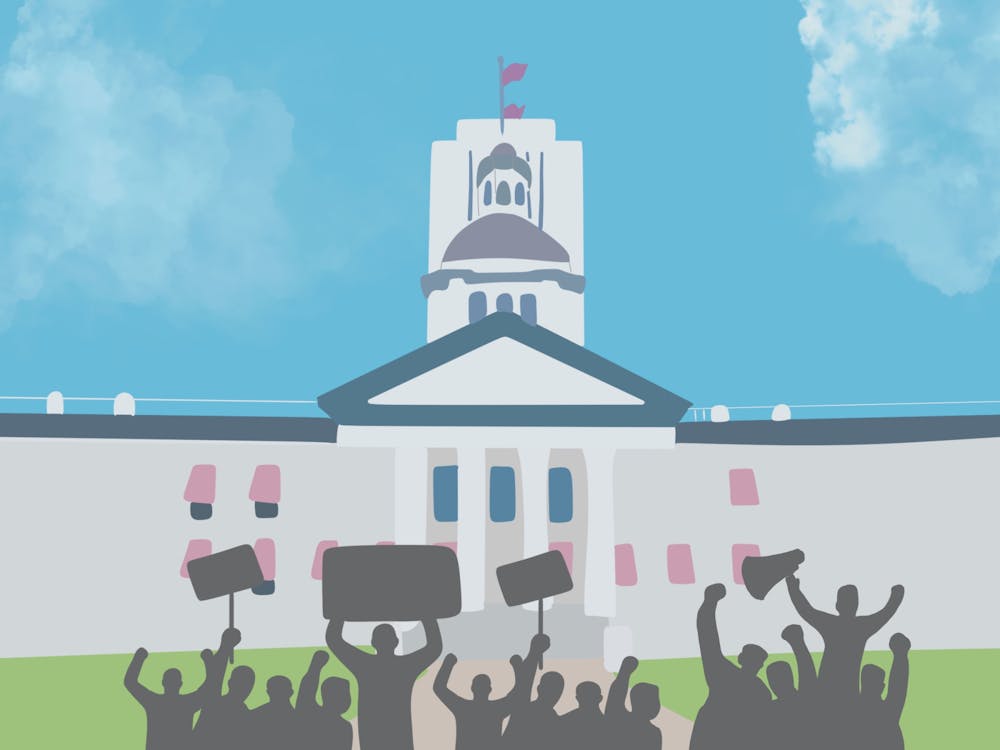During the 2021-22 school year, 717 students in Florida public K-12 schools were paddled, spanked or otherwise struck by a teacher or principal. Under Florida’s state statute, schools have every right to do so.
Corporal punishment, defined in Florida statute as the use of physical force or contact on a student to maintain discipline, is legal in 19 Florida school districts.
Six students from UF Florida Student Policy Forum visited Tallahassee Oct. 18 during the legislature’s interim committee weeks to advocate an amendment to the statute that would ban corporal punishment for students with disabilities and require parental consent for use of corporal punishment in all cases.
The bill has a House sponsor, and the group’s trip to Tallahassee was focused on finding a Senate sponsor — preferably a Republican legislator, to increase the bipartisan appeal of the bill — and House co-sponsors, said FSPF political director Graham Bernstein, who authored the amendment along with 22-year-old UF alumnus and Lake Erie College medical student Konstantin Nakov.
Bernstein, a UF history and political science junior, began looking into corporal punishment in public schools two years ago and was shocked to find the practice is still legal in Florida, he said. Bernstein was raised in Alachua County, one of Florida’s 54 school districts where the practice is banned, and never realized its effects, he said.
Bernstein originally hoped to end the practice in public schools altogether but was met with resistance from Republican legislators. After many nights spent researching the topic until 3 a.m., drafting and redrafting legislation, Bernstein learned the disproportionate effect of corporal punishment on children with disabilities and adjusted the bill to focus on protecting those students instead.
Corporal punishment and students with disabilities
Students with disabilities served under the Individuals with Disabilities in Education Act made up 15% of Florida students in the 2017-18 school year but counted for 22.3% of students who experienced corporal punishment.
IDEA, created in its current form in 1990, serves students in public schools aged 3 to 21 with learning disabilities, speech or language impairments or developmental disabilities like autism.
Some of these students can’t communicate well verbally, or they may be hearing impaired or have trouble reading or learning, Bernstein said. Physical punishment shouldn’t be applied as a one-size-fits-all solution to accommodate difficulties students with disabilities face, he said.
Corporal punishment is used on these students, not as a last resort, but as an impulse response to poorly documented reasons including using fidget spinners, bringing caffeinated drinks and engaging in horseplay, Bernstein said.
Even in Florida counties, which have banned corporal punishment, the practice is still being used toward students with disabilities.
When a bus monitor in Lake County used corporal punishment against special needs students — putting one child in a headlock and putting a shoe over the mouth of another — charges were dropped even though the district doesn’t allow corporal punishment in schools or on school buses. The state law sanctioning corporal punishment superseded the district law and led the monitor’s 32 charges to be dropped.
Lafayette County had the highest rate of corporal punishment dealt to disabled students in the 2022-23 school year. Of the 25 corporal punishment usages, 17 — or 68% — were on students covered under IDEA, according to Melissa Dicks, secretary to superintendent and school board for Lafayette County School District.
The majority of Florida counties that currently allow corporal punishment are rural and low income. Lack of funding for public schools means districts allowing corporal punishment are often unequipped to deal with mental health and behavioral issues associated with students with disabilities, Bernstein said.
Of the 19 counties in Florida with sanctioned corporal punishment today, only one — Wakulla County, which is part of the Tallahassee metropolitan area — has a median household income above the Florida median income of $61,777, according to Florida Health records from 2021.
“These school districts need support, not corporal punishment,” Bernstein said in a report on county statistics.
For Nakov, who hopes to be a psychiatrist one day, the idea that corporal punishment could be used as an effective discipline is bewildering. A child’s early education and the bonds of trust between schools, children and parents set up that child’s future, and corporal punishment damages those bonds, he said.
“Someone who you’re supposed to trust doing that in front of other people, in front of your peers, it can sow mistrust,” he said. “There’s many, many deeper levels to that.”
None of the 19 counties allowing corporal punishment met the American School Counselors’ Association’s recommended ratio of 250 students per counselor, according to data from a 2015 study from the Office of Program Policy Analysis and Government Accountability.
Banning corporal punishment of students with disabilities would force schools to look at why those kids are experiencing issues with discipline, rather than just striking them without investigation, Bernstein said.
The proposed amendment to Florida Statute 1003.32 would ban corporal punishment in any circumstances against students who participate in special education services, certified unaccompanied homeless youth or students who attend an alternative education institution.
Alternative education institutions serve children with disabilities and those who have struggled with discipline, attendance and academic performance. School corporal punishment has been used at alternative schools in Holmes County, Jackson County and Columbia County, Bernstein said.
“These are children who may be experiencing violence at home, may have mental health issues, may have experienced homelessness or worse,” he said in the report. “And yet, these children — and children with disabilities — are experiencing school corporal punishment.”
Parental rights in corporal punishment
Bernstein describes his proposed legislation as a “two-pronged approach.” While part of his amendment would target children with disabilities, the new statute would also require parental consent in all cases that corporal punishment is used, he said.
Parental rights in education have been a big issue in Florida for the past two legislative sessions, said 20-year-old UF industrial systems engineering sophomore Wesley Littleton, a FSPF member who went to Tallahassee with Bernstein to drum up support for the bill.
“We’re not trying to completely get rid of corporal punishment — we want to make sure that parents have a say,” Littleton said. “I think most [legislators] are receptive to that … they’re willing to work with us for sure.”
Littleton grew up in Bay County, a school district in the panhandle that doesn’t allow corporal punishment. He didn’t know anyone who received corporal punishment growing up, but the issue is relevant to his area, he said.
“There was a school for boys here, a military school called the Dozier School for Boys, and they have a history of some really terrible punishments — boys were killed here,” he said. “So it really is relevant to my area, that history behind corporal punishment.”
Parents know their children best and should have the right to decide if or how they want their child to be disciplined, Bernstein said. By presenting the issue as a case for parental control in education, he hopes to appeal to legislators on both sides of the political spectrum.
“I really like looking at these different policy areas … where there’s room for bipartisan agreement where people on both sides might agree, but they just need someone to bring them together,” Bernstein said.
Under the proposed amendment, parents would receive a consent form at the beginning of the school year through which they can delegate the right to use corporal punishment on their children to schools.
Paddling children without parental consent has led to controversy in Florida in recent years. In one 2011 Levy County offense, a preschool boy’s paddling left welts on his body — even though his mother, Tenika Jones, didn’t consent to the use of corporal punishment.
Her son’s crying upon being paddled for slapping another preschooler on the bus provoked an asthma attack that prevented him from breathing properly, the Gainesville Sun reported.
If his bill passes, it wouldn’t change the world, Bernstein said. But it would help students — students like Jones — and add legitimacy to FSPF and to the idea that young people can and should have a say in government, he said.
For Carlos Alemany, a UF political science junior who visited Tallahassee with FSPF to work on his own legislation project involving tourism revenue in the Orlando area, the corporal punishment bill is a testament not just to Bernstein’s work ethic but to the accessibility of citizen advocacy in the legislature.
“I am not taking away from Mr. Bernstein’s brilliance, but, seriously, anybody can write a bill,” Alemany said. “That’s something this club serves to emphasize and make clear.”
Bernstein hopes to see the bill pass by the time he graduates, but realizes Florida’s legislature is slow-moving. Even a bill everyone agrees on may take years to pass because legislators only have 60 days of session per year to approve legislation and have to prioritize some bills over others to make the most of their time.
FSPF will continue to search for a Senate sponsor and meet with groups like the Florida teacher union to fineline and promote the amendment.
This article has been updated to reflect the correct county where Littleton is from as well as this legislation amending a state statute and not the constitution. The Alligator previously reported otherwise.
Contact Zoey Thomas at zthomas@alligator.org. Follow her on Twitter @zoeythomas39.
Zoey Thomas is a media production junior and The Alligator's Spring 2025 data editor. She previously reported for the metro, university and enterprise desks. In her free time, you can find her reading, crocheting or arguing for the superiority of sweet potatoes over regular potatoes.






